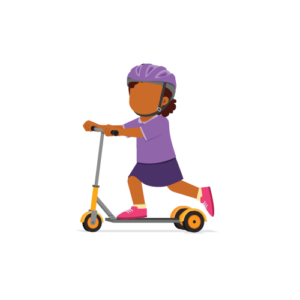Neurodiversity is the wide variety of ways we think, learn, feel and process information.
We all have different interests and motivations, and are naturally better at some things and not so good at others. Most people are known as ‘neurotypical’, which means their brain generally functions and processes information in the way society expects.
We think around one in seven children in the UK are neurodivergent, meaning their brain works and processes information in a different way.
Neurodivergent children may have a range of conditions including:
By accepting and valuing the ways neurodivergent children experience and interpret the world around us, we can help to reduce the stigma they feel, improve their outcomes and even make amazing things happen.
 All children are unique and will develop at different rates. Some children and young people may require more help to learn and develop than others of the same age because of a physical disability, neurodivergence or a learning need. They may be classed as having special educational needs or disability (SEND) and they may get extra support.
All children are unique and will develop at different rates. Some children and young people may require more help to learn and develop than others of the same age because of a physical disability, neurodivergence or a learning need. They may be classed as having special educational needs or disability (SEND) and they may get extra support.
If you are worried about your child's development, the first step is to explore the support available. Kent County Council has a helpful quiz to guide families.
You can talk to your child's childcare or education setting to discuss the support that can be put in place for them. If your child isn't in childcare, speak to your health visitor or GP to access support. You can find a video about what support is available and who to speak to if you think your child has SEND needs. Contact your child's school or nursery before they start to get that support in place for them as early as possible. With that extra support children will make good progress.
Your child's childcare or education setting should plan extra learning support for your child if they think they have SEN. You can find out more about support available to you and your child at the Kent County Council's Local Offer website.
If your child isn't making the expected progress despite the support put in place, you can request an education health and care (EHC) assessment for your child. You do not need a neurodivergence diagnosis to apply for an EHC.
Information Advice and Support Kent (IASK) offers free, impartial and confidential information, advice and support about special educational needs and disabilities (SEND) for children, young people up to age 25, parents and carers.
Diagnosing neurodivergence is highly specialised and can be difficult as symptoms of the different conditions like autism and ADHD often overlap. Waiting lists for assessments are very long across the country, but you don’t need to wait for a diagnosis to start helping your child.
Support available
- Health Visiting Team and School Health are a team of nurses and practitioners who work with children, young people and families in Kent. We offer one-to-one support based on your child’s needs and can support a referral to health or education specialists if your child needs further support.
- Kent County Council special educational need and disability (SEND) information hub - information for families with children with special educational needs or disabilities about what support services are available in their area.
- KCHFT Children's Therapy Pod - has useful resources, films and links that can help your child achieve their goals.
- An online hub has been created where neurodivergent people living in Kent and Medway can find information and links to local and national support. Focussing on learning disability, autism and attention deficit hyperactivity disorder (ADHD), the hub is split into sections for adults, children and young people, making it easy to navigate. There is also a section on Right to Choose which answers frequently asked questions. As well as links to local support groups and support available in schools, the hub features advice on everyday life – including sensory differences and sleep – education, employment and volunteering, and keeping safe and well. Visit the support hub at www.NDKentAndMedway.co.uk